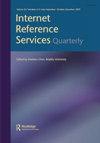A Structural Equation Modeling Approach to Evaluating Library Personnel Intention to Adopt Big Data Technology in Nigerian Academic Libraries
Q3 Social Sciences
引用次数: 2
Abstract
Abstract Big data technology has gained prominence among academia and organizations around the world. As libraries continue to receive data from different sources like physical and electronic books and journals, recordings, maps, field trip documentation, and a host of others, big data technology becomes essential in managing all these datasets. However, much is unknown about its adoption among library personnel in academic libraries in Nigerian tertiary institutions. Thus, the research examined librarians’ behavioral intentions to adopt big data technology in Nigerian universities. Data were collected through a questionnaire distributed to 317 library personnel. The hypothesized relationships in the model were tested using the Covariance-Based Structural Equation Modeling (CB-SEM). The results show that performance expectancy, social influence, and facilitating conditions influence behavioral intention to adopt big data technology. Contrarily, effort expectancy does not influence behavioral intention to adopt big data technology. With 50% of the variance in library personnel’s intention to use big data technology explained by this model, it could help determine factors that could influence big data technology acceptance and use in academic libraries.结构方程建模法评估尼日利亚高校图书馆人员采用大数据技术的意愿
摘要大数据技术在世界各地的学术界和组织中获得了突出地位。随着图书馆继续接收来自不同来源的数据,如实物和电子书籍和期刊、录音、地图、实地考察文档以及其他许多来源,大数据技术在管理所有这些数据集方面变得至关重要。然而,尼日利亚高等院校学术图书馆的图书馆工作人员对其采用情况却知之甚少。因此,该研究考察了尼日利亚大学图书馆员采用大数据技术的行为意向。数据是通过向317名图书馆工作人员分发的问卷收集的。使用基于协方差的结构方程建模(CB-SEM)对模型中的假设关系进行了测试。结果表明,绩效预期、社会影响和便利条件会影响采用大数据技术的行为意愿。相反,努力预期并不影响采用大数据技术的行为意愿。该模型解释了图书馆工作人员使用大数据技术意愿的50%差异,有助于确定影响大数据技术在高校图书馆接受和使用的因素。
本文章由计算机程序翻译,如有差异,请以英文原文为准。
求助全文
约1分钟内获得全文
求助全文
来源期刊

Internet Reference Services Quarterly
Social Sciences-Library and Information Sciences
CiteScore
2.40
自引率
0.00%
发文量
13
期刊介绍:
Internet Reference Services Quarterly tackles the tough job of keeping librarians up to date with the latest developments in Internet referencing and librarianship. This peer-reviewed quarterly journal is designed to function as a comprehensive information source librarians can turn to and count on for keeping up-to-date on emerging technological innovations, while emphasizing theoretical, research, and practical applications of Internet-related information services, sources, and resources. Librarians from any size or type of library in any discipline get the knowledge needed on how to best improve service through one of the most powerful reference tools available on the Internet.
 求助内容:
求助内容: 应助结果提醒方式:
应助结果提醒方式:


